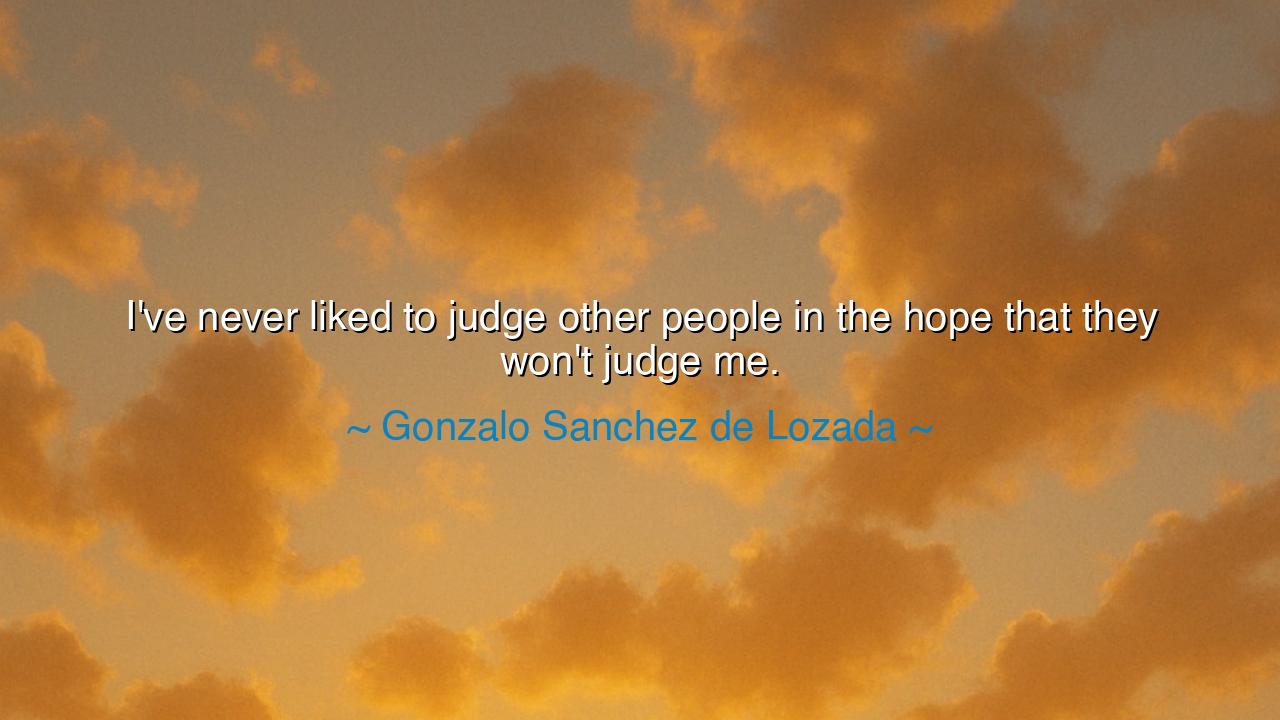
I've never liked to judge other people in the hope that they






“I’ve never liked to judge other people in the hope that they won’t judge me.” Thus spoke Gonzalo Sánchez de Lozada, a leader who understood, perhaps from the scars of his own life in public service, that the act of judgment is both a human impulse and a human peril. Beneath this simple statement lies a truth as ancient as civilization itself: that to judge another is to invite judgment upon oneself, and that mercy, extended outward, is the surest protection of the soul. His words carry the humility of one who has stood before both praise and condemnation, who has seen how swiftly the world turns from admiration to reproach. In this reflection, he speaks not only for himself but for all who walk the uneasy path of power and imperfection.
For in every age, mankind has struggled with this impulse to weigh and condemn others. We are quick to see the faults of our neighbor, yet blind to our own. The great teacher Jesus of Nazareth spoke this same truth in words that still thunder through time: “Judge not, lest ye be judged.” To judge is easy; to understand is divine. Sánchez de Lozada, like many before him, recognized that the harshness we show to others becomes the mirror that reflects upon our own hearts. For those who live in glass houses, as the ancients might say, it is wisdom—not fear—that teaches restraint.
Consider, then, the example of Marcus Aurelius, the philosopher-emperor of Rome. Though he commanded legions and ruled over vast lands, he practiced the art of humility. In his Meditations, he reminded himself daily not to grow arrogant, not to measure others by their faults, for all men are bound by the same weaknesses. He ruled knowing that his judgment must be tempered with empathy. It is said that he forgave his enemies even when victory granted him the right to punish them. Why? Because he knew that life itself is fragile and that tomorrow, he too could stand condemned by forces beyond his control. This is the wisdom behind Sánchez de Lozada’s words: mercy towards others shields the heart from the tyranny of pride.
To refrain from judgment does not mean to abandon discernment or justice. It means to act from understanding rather than condemnation, from compassion rather than superiority. Every soul carries hidden burdens, unseen battles, private griefs. The man who walks the road of humility does not presume to know another’s pain. In the silence of such understanding, he finds peace. But the one who lives to condemn others finds no rest, for his world becomes a constant court of accusation—one day as the judge, and the next as the judged.
Sánchez de Lozada’s words also carry the echo of self-awareness, a confession of human vulnerability. To hope that others will not judge us is to acknowledge that we, too, are flawed. We are all, in truth, travelers on the same uncertain road, stumbling between right and wrong, light and shadow. To judge less is to love more—to offer the grace we ourselves desire when our own hearts are found wanting. In this way, the act of withholding judgment becomes a form of compassion, an unspoken pact between souls: “I will forgive your frailty if you forgive mine.”
History is filled with those who fell beneath the weight of harsh judgment—some rightly condemned, others misunderstood. Yet rarely do we remember how often mercy changed the course of destiny. When Abraham Lincoln faced the chaos of civil war, he was urged to punish his enemies mercilessly. But he replied, “Do I not destroy my enemies when I make them my friends?” In that choice lay not weakness, but greatness—the strength to rise above vengeance, to extend understanding where bitterness could have reigned. His restraint, like Sánchez de Lozada’s sentiment, sprang from the recognition that judgment divides, but empathy redeems.
And so, dear reader, let this be your lesson: be slow to judge, and swift to understand. Before your lips form words of condemnation, remember that your own heart awaits the same mercy. Look upon others not with suspicion, but with patience. For every fault you find in another, a similar one may rest within yourself. As Sánchez de Lozada teaches, if you wish to live unburdened by the scrutiny of others, begin by releasing your own impulse to condemn. The more grace you give, the more peace returns to you.
Thus, live not as a judge, but as a witness to the shared frailty of humankind. Forgive easily. Speak gently. And when the world would have you harden your heart, choose instead the strength of compassion. For in the end, those who do not judge unjustly shall themselves be spared from unjust judgment—and their spirits, like still water, shall reflect the quiet wisdom of mercy.






AAdministratorAdministrator
Welcome, honored guests. Please leave a comment, we will respond soon